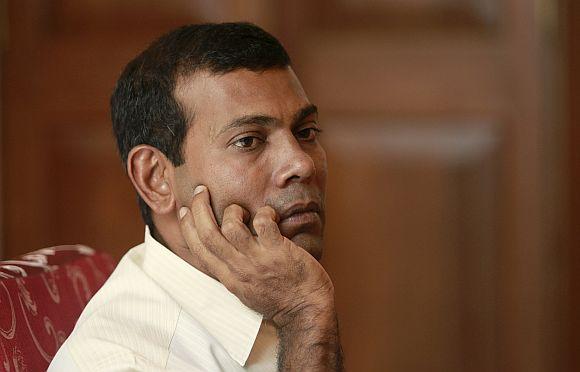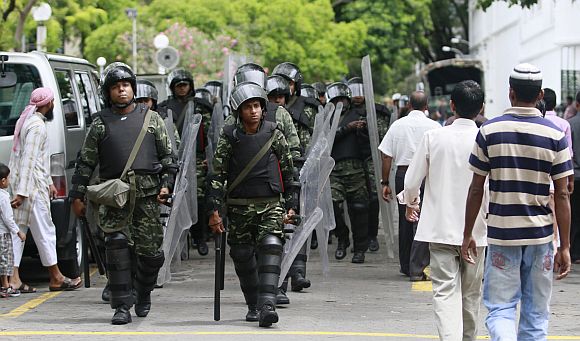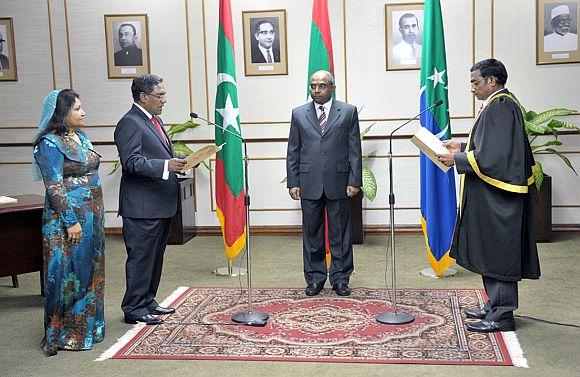 | « Back to article | Print this article |
'There's danger of Islamic radicalism in the Maldives'
Former Maldivian president Mohamed Nasheed, who was in New Delhi for the last five days trying to drum up support for his demand for establishing a popular government in Male, met Prime Minister Manmohan Singh on Monday and discussed the political situation in the Maldives and its future.
Nasheed, who was ousted in February, is pushing for early polls. He also met other senior officials during his ouster.
He spoke to CNN-IBN's Suhasini Haidar.
You are in Delhi to meet with the Indian leadership, to put the plea across for early elections. Many in India would ask, why should India get involved? Why should India even care? What's happening inside the Maldives is essentially an internal matter.
Coming to your question, why should India be concerned about this at all? We are talking of the Indian Ocean. More than 80 percent of the trade that comes to India and goes from India actually crosses the Maldives, and if there is instability in the Maldives it is going to of course have a serious impact on India.
If we aren't able to have earlier elections in the Maldives, the dictatorship with the radical Islamists are going to get more entrenched, and it's going to be difficult to dislodge them if you give more time to them. So, I think it's very, very important for the Indian government and the people of India to see that there are early elections in the Maldives.
President Mohamed Waheed has said, and in fact this week the president's office has put out a notification saying they expect to hold elections early by July 2013. But that's not early enough for you?
Well, those are the scheduled elections, they are not the elections that we are talking about. The central issue here is, the people of the Maldives must be governed by a person who they have decided upon. We have to give them the opportunity to decide who should govern them. We had a free and fair election in 2008, and through a coup that government has been overthrown, and we have now a government that was formed through brute force, and we cannot let this situation go.
All right, you're saying they must be able to decide. Yet, the world, if we can go back to the events of that day, saw you stepping down on television, saying that you were resigning. A day later you said it was done under force. What was the kind of pressure that you faced?
Well, there was a mutinous police force outside, and there were sections of the military in league with this police force while I was inside the military headquarters. I was minutes away from being mobbed, and I had to save my life and the life of many, many, many other Maldivians, so I was forced to resign.
Click NEXT to read further...
For Realtime News on Maldives, click here
'We were shocked by India's reaction'
Was there no one you could call? Did you ever try to make that call?
I did. I rang my national security advisor, I told him to ring the Indian high commissioner, and he did and we explained the situation very clearly to the Indian high commissioner. I did explain the situation to anyone whom I could. But while I was inside the military headquarters, I couldn't make any calls because the calls were jammed there.
All right, just a few months before that, you hosted the Saarc summit, we saw you meeting with not just the Indian leadership but the leadership of the region. A year before that you gave an interview talking about your close ties with Prime Minister Manmohan Singh, somebody who listens to you. Why do you think the Indian leadership failed to hear your plea that night?
I think there might have been initial reports going from the Maldives to Delhi, certainly someone has got the wrong end of the stick.
In fact, within 12 hours practically of that dramatic resignation, Dr Singh sent that statement you were speaking about, congratulating President Waheed. Did you feel disappointed? Did you feel let down?
I do understand the difficulties that Indian governments have when dealing with neighbours. I do understand that India must recognise someone everywhere. In any country, whoever has the coffers and the armory, India must recognise these people and be able to deal with them. But, yes we were shocked. I was sad.
And now that you are here in New Delhi, what is it that you expect that they will do? A leadership that didn't hear you a month ago, what are you hoping that they will do now?
I've had many conversations with your leadership from then on. I've had many, many telephone conversations, and I am encouraged that they are re-aligning their policies towards what is happening on the ground.
And in fact, Foreign Secretary Ranjan Mathai did broker a deal with the political parties to have early elections, and he did get signatures of all for this document. And now they're backtracking on the document and this cannot be held. The government in the Maldives must honour its words to the Indian government.
Let's talk about the situation in your country. Some would say you said you faced pressure from a mutinous army, a violent police force that forced you to resign. Yet a day later, weeks later, we saw you out on the streets openly taking them on. Some would say perhaps there isn't so much of a danger to you if a government is allowing you to come out and protest, is allowing your people to come out and protest. It's a functioning democracy.
Well, we are more. They try to beat us up everyday, they're trying it everyday. They've run out of tear gas, they've really exhausted their batons, and people are coming out everyday. More than 65 percent of the population of the Maldives is below 35, and it was they who brought me to the presidency, and they are not going to relent.
Click NEXT to read further...
'This is Gayoom back again'
All right, you mentioned earlier that you think President Waheed does not lie easily. Who do you think is behind his acceptance of the presidential position?
Maumoon Abdul Gayoom. There's no doubt about that. Even though Dr Waheed is mentioning that there are no Gayoom loyalists and Gayoom people in his cabinet, just have a look at it. Gayoom's son and his daughters are there, all his cabinet ministers are there, all his associates are there, all his cronies are there. This is Gayoom back again. There's no doubt about that.
You've also hinted, in fact you said earlier about the fear of Islamic radicalism as a part of it. In fact, part of the opposition to you has always been that you are not taking into account the popular Islamist feeling of your people. What's the real worry here?
There is a very, very strong danger of Islamic radicalism taking hold in the Maldives, and it is happening, and we must be mindful of that. The conservative Islamic party fought against us in three elections, in the presidential elections they lost badly, in the parliamentary elections they did not get a single seat, in the local council elections they did not get a single seat. But after the coup, they have three cabinet portfolios.
Serious worries over there from every end. But even so, many would say the real worry for Maldivians is tourism. It's the lifeline of the economy, and what you are doing, taking on the government everyday with these protests, is in fact jeopardising tourism in the country.
Wouldn't it be okay for you to say, okay you've resigned, you continue to be a very large part of the Parliament, you have 34 seats over there, you can continue your democratic protests, but wait until the next election, why are you contributing to the political instability of your own country?
I am afraid if we do not have elections now, we will never have an election. We go into a situation like Burma, but worse, we go into a situation like Pakistan where the military calls the shots, and we are never going to have an election.
If you do get your wish to be re-instated, what would you say is the big lesson you've learned?
My lesson is, you can get rid of a dictator, but you cannot easily get rid of a dictatorship. The intricacies, the institutions, the culture of it, it takes a long time to flush it out. Now, the lesson is that we have to do it quickly and fast.
Watch Worldview (external link)
TOP photo features of the week
Click on MORE to see another set of PHOTO features...



